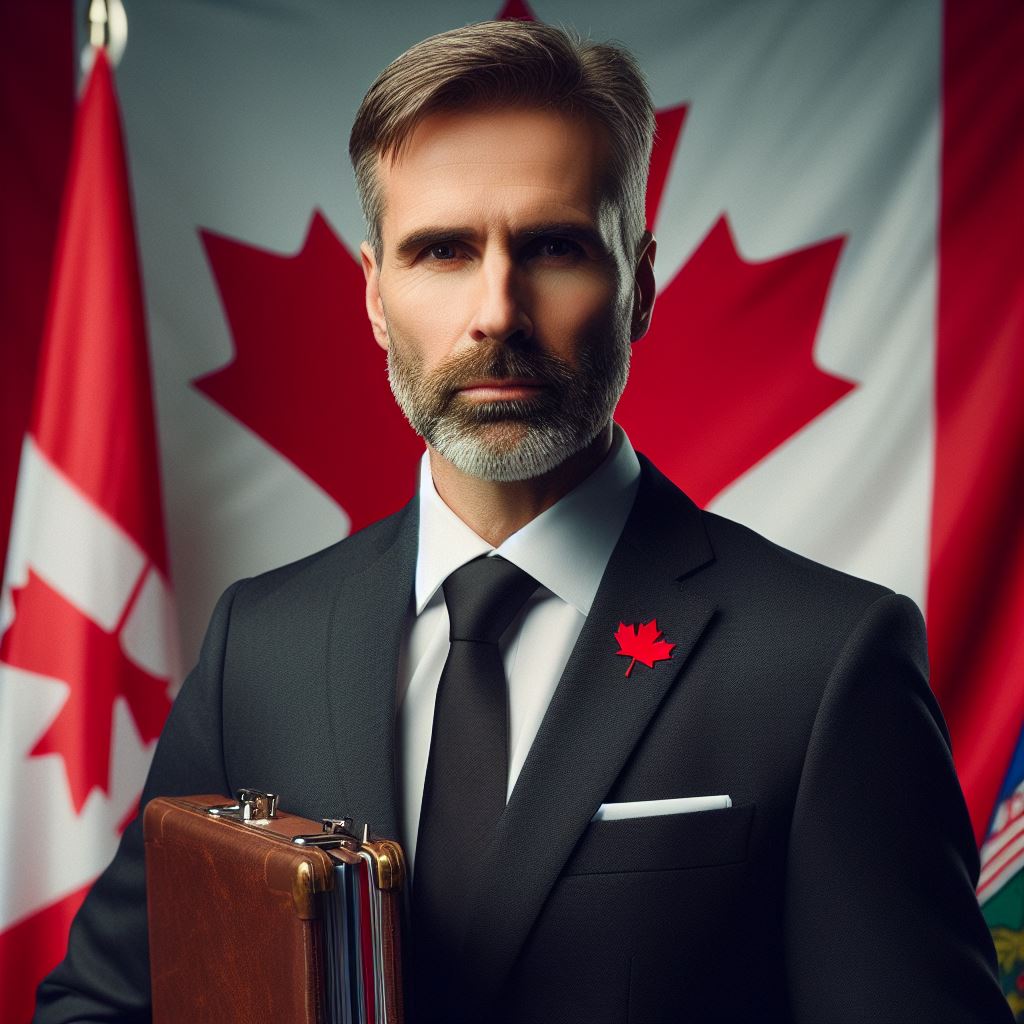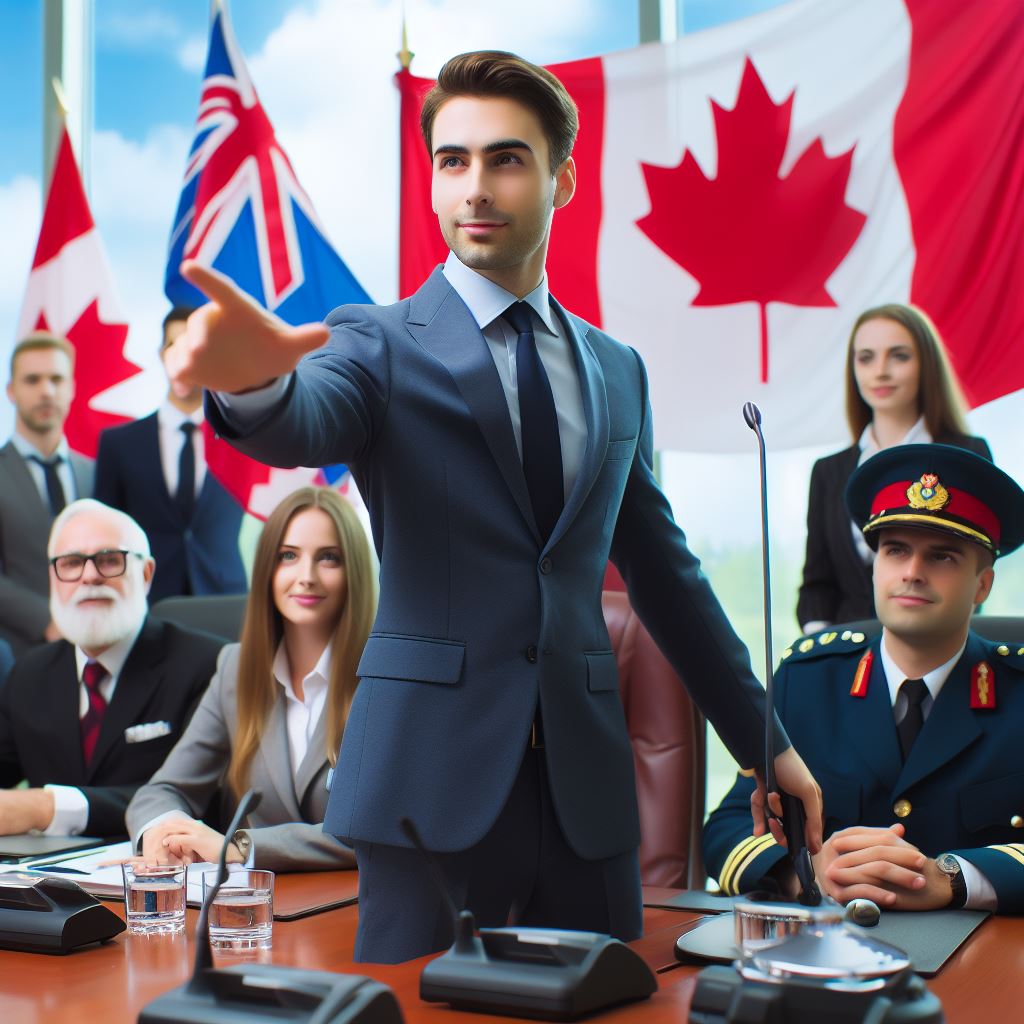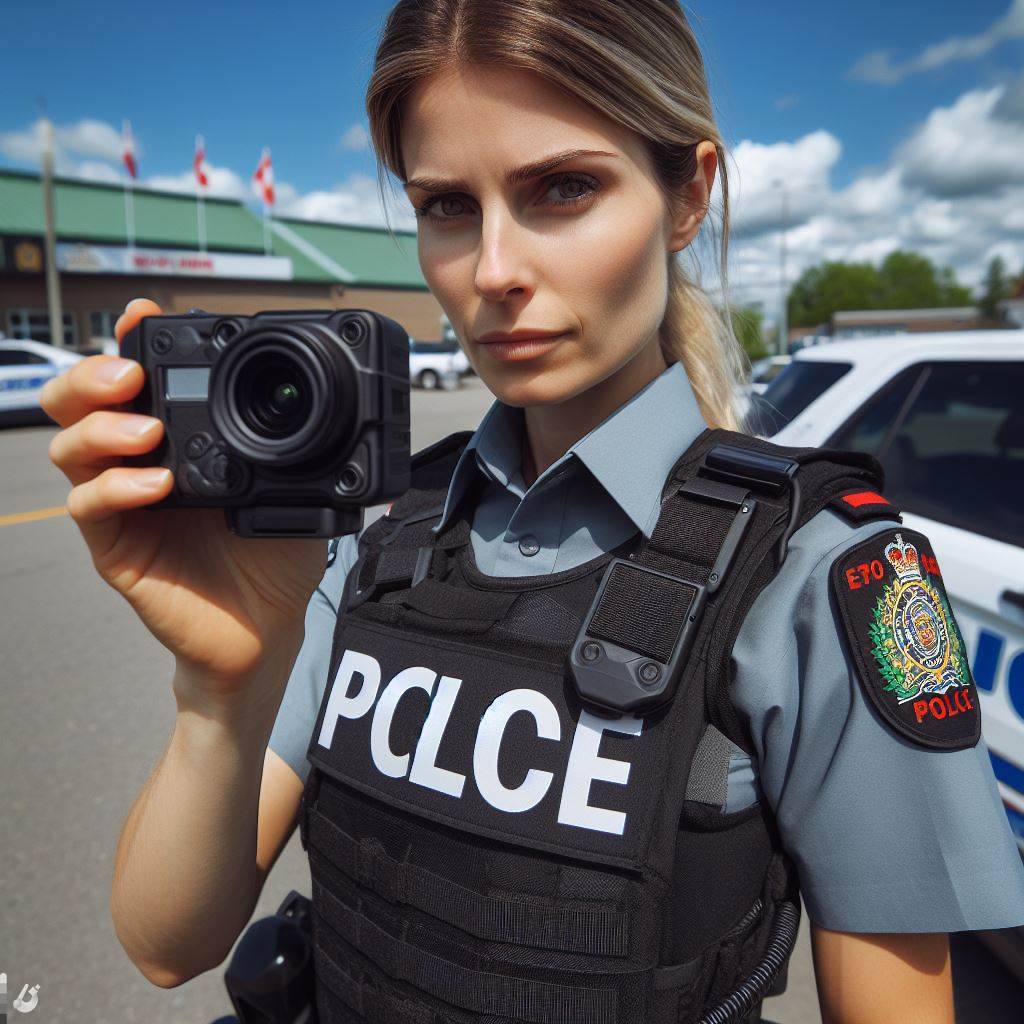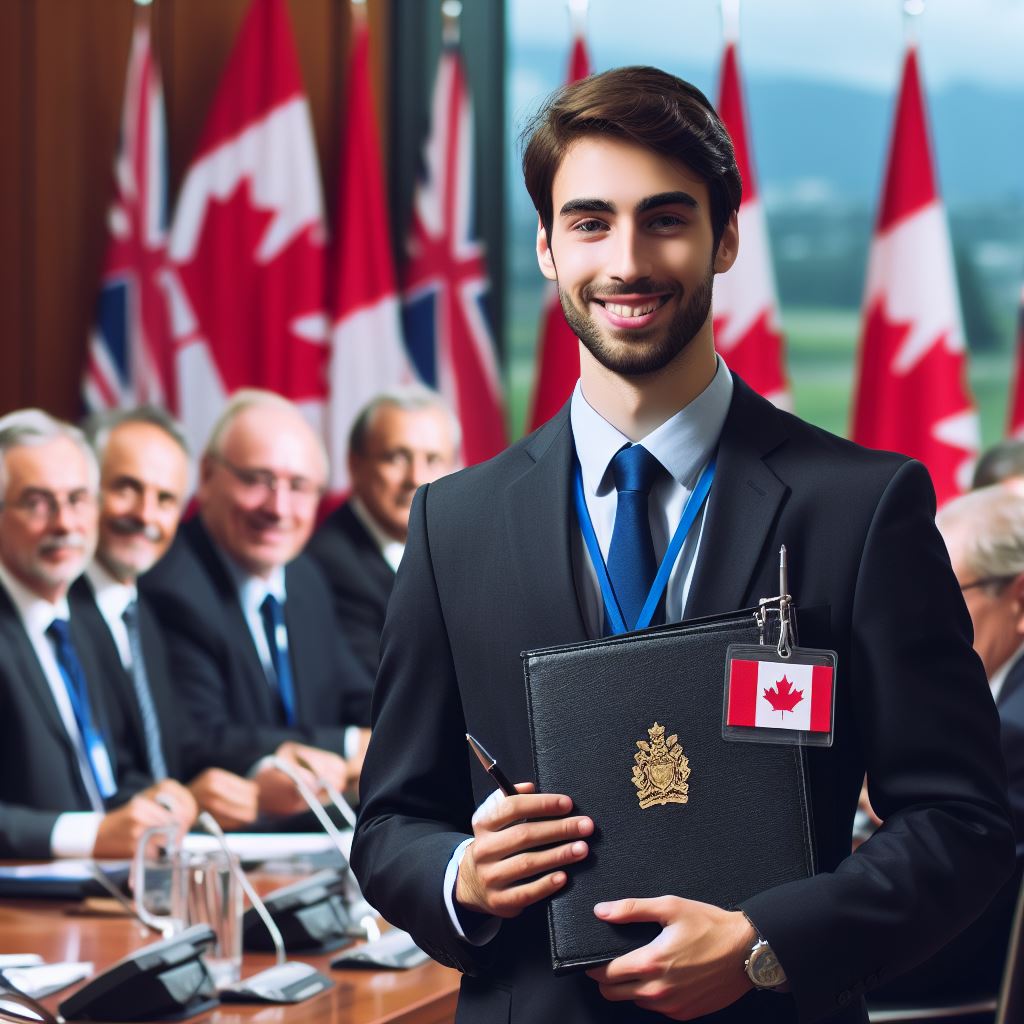Introduction
Canadian diplomats play a crucial role in representing Canada’s interests and building diplomatic relationships with other countries.
The role of Canadian diplomats involves negotiating treaties, promoting trade, and providing assistance to Canadians abroad.
Skills and qualifications are of utmost importance in the field of Canadian diplomacy.
Diplomats must have excellent communication and negotiation skills to effectively represent Canada’s interests.
They need to be knowledgeable about international relations, politics, and cultural dynamics to navigate complex diplomatic situations.
Language proficiency is also an essential requirement for diplomats as they need to communicate fluently in different languages.
Furthermore, diplomats must possess strong analytical and problem-solving skills to address diplomatic challenges.
Leadership and teamwork skills are crucial for diplomatic missions that require collaboration with other diplomats and organizations.
In addition, diplomats must have a deep understanding of Canadian domestic policies, foreign affairs, and global issues.
They should be adaptable and flexible to work in different cultural, political, and social contexts.
The ability to develop and maintain relationships with various stakeholders is also essential for diplomats.
In short, the skills and qualifications of Canadian diplomats are vital for promoting and protecting Canada’s interests in the international arena.
Their expertise in communication, negotiation, and diplomacy is crucial for successful diplomatic relations and international cooperation.
Education Requirements for Canadian Diplomats
Bachelor’s degree in a relevant field
Earning a bachelor’s degree in a relevant field is a crucial education requirement for Canadian Diplomats.
Fields such as international relations, political science, or public administration offer suitable knowledge.
Advanced degrees
Advanced degrees, such as a Master’s or PhD, provide further benefits for aspiring Canadian diplomats.
These higher degrees offer specialized knowledge and a deeper understanding of international affairs.
Having an advanced degree can also enhance a candidate’s competitiveness in the job market.
Additional certifications or language proficiency
In addition to degrees, diplomats may benefit from obtaining additional certifications related to their field.
These certifications demonstrate a commitment to continuous learning and professional development.
Language proficiency is another important skill for Canadian diplomats.
Being able to communicate effectively in multiple languages allows them to navigate various diplomatic situations.
Proficiency in languages such as French, Spanish, and Arabic can be highly advantageous.
Diplomats must be able to effectively represent Canada and negotiate confidently in international settings.
Having a strong understanding of Canadian foreign policy is also crucial for diplomats.
Unlock Your Career Potential
Visualize a clear path to success with our tailored Career Consulting service. Personalized insights in just 1-3 days.
Get StartedThey must be knowledgeable on issues such as trade agreements, security policies, and humanitarian efforts.
Diplomats must also possess a strong set of interpersonal skills to navigate diplomatic relationships.
These skills include effective communication, strong negotiation abilities, and cultural sensitivity.
Problem-solving and critical thinking skills are also essential for diplomats to address complex international issues.
Diplomats must be able to analyze situations, consider different perspectives, and propose viable solutions.
They must also have a high level of adaptability and be able to thrive in diverse and challenging environments.
Canadian diplomats must possess strong leadership skills in order to represent the country effectively.
They must inspire trust and confidence and be able to make important decisions under pressure.
Effective teamwork skills are also essential for diplomats, as they often work with teams of professionals.
This teamwork may involve collaboration with other diplomats, government officials, or non-governmental organizations.
In fact, Canadian diplomats require a combination of educational qualifications, certifications, and language proficiency.
These skills and qualifications enable them to excel in their role as representatives of Canada on the global stage.
Diplomats must possess a strong knowledge base, effective communication skills, and the ability to handle complex international issues.
By fulfilling these requirements, potential diplomats can contribute to maintaining Canada’s reputation as a respected and influential nation.
Read: Women in Diplomacy: Focus on Canada
Essential Skills for Canadian Diplomats
When it comes to being a successful Canadian diplomat, there are certain essential skills and qualifications that one must possess.
These skills are crucial in representing the interests of Canada and maintaining diplomatic relations with other countries.
In this blog section, we will explore some of the most important skills required for Canadian diplomats.
Strong Communication Skills
Effective communication is at the heart of diplomacy.
Canadian diplomats must be skilled in both verbal and written communication to effectively convey messages and negotiate with foreign counterparts.
Verbal proficiency allows diplomats to engage in meaningful conversations and build relationships with their counterparts.
Likewise, strong written communication skills are vital for drafting official diplomatic correspondence and reports.
Cultural Sensitivity and Adaptability
Diplomats often find themselves working in foreign countries with diverse cultures and customs.
It is essential for Canadian diplomats to be culturally sensitive and adaptable to effectively navigate these differences.
By understanding and respecting different cultural practices, diplomats can build trust and rapport with their hosts, fostering better diplomatic relations.
Public Speaking and Negotiation Skills
As representatives of Canada, diplomats must often engage in public speaking and negotiation.
Public speaking skills are necessary for delivering speeches and presentations that effectively communicate Canada’s positions and policies.
The ability to negotiate is crucial in achieving diplomatic objectives and resolving conflicts.
Diplomats must possess strong negotiation skills to find common ground and reach mutually beneficial agreements.
Leadership and Interpersonal Skills
Canadian diplomats are often required to lead teams, coordinate efforts, and build relationships with various stakeholders.
Strong leadership skills are vital in effectively managing diplomatic missions and ensuring the successful execution of policies.
Additionally, diplomats need strong interpersonal skills to foster cooperation, build productive networks, and maintain relationships with colleagues and key individuals in their host countries.
In essence, being a Canadian diplomat requires a unique set of skills and qualifications.
Effective communication, cultural sensitivity, and adaptability are essential for building relationships and representing Canada’s interests.
Public speaking and negotiation skills are crucial in effectively conveying Canada’s positions and achieving diplomatic objectives.
Lastly, strong leadership and interpersonal skills are necessary for successful diplomatic missions.
By possessing these essential skills, Canadian diplomats can effectively represent Canada on the international stage and contribute to diplomatic efforts for the betterment of the country.
Read: The Art of Negotiation: A Diplomat Toolkit
Knowledge of Diplomatic Processes and International Affairs
In order to excel in their roles, Canadian diplomats need to possess a wide range of skills and qualifications.
Their expertise and knowledge in diplomatic processes, international affairs, Canadian foreign policy, global political systems, cultures, and international law are crucial.
Canadian diplomats must have a deep understanding of diplomatic processes and international affairs.
This includes being familiar with negotiation techniques, conflict resolution, and the art of diplomacy.
They need to be well-versed in current events, global issues, and the geopolitical landscape.
This knowledge enables them to effectively represent Canada’s interests abroad and engage in meaningful diplomatic discussions with representatives from other nations.
Understanding of Canadian Foreign Policy
Another essential requirement for Canadian diplomats is a thorough understanding of Canadian foreign policy.
They need to be well-acquainted with the guiding principles, values, and priorities that shape Canada’s international relations.
This understanding enables diplomats to align their work with the goals and objectives set by the Canadian government.
It also helps them to effectively advocate for Canadian positions in international forums and negotiations.
Knowledge of Global Political Systems and Cultures
Being knowledgeable about global political systems and cultures is crucial for Canadian diplomats.
They need to grasp the intricacies of different political systems and understand the cultural nuances that exist between nations.
This knowledge allows diplomats to navigate complex diplomatic environments and build strong relationships with foreign counterparts.
It enhances their ability to bridge cultural gaps, foster understanding, and promote collaboration between Canada and other countries.
Familiarity with International Law and Diplomacy Protocols
Canadian diplomats must also have a solid understanding of international law and diplomacy protocols.
They need to be well-versed in the conventions, treaties, and agreements that govern diplomatic interactions between nations.
This familiarity ensures that diplomats can effectively represent Canada’s interests while respecting international legal frameworks.
It also allows them to navigate diplomatic challenges and disputes in a diplomatic and lawful manner.
In general, Canadian diplomats play a crucial role in advancing Canada’s interests in the global arena.
To excel in their positions, they need to possess a range of skills and qualifications, including knowledge of diplomatic processes, international affairs, Canadian foreign policy, global political systems, cultures, and international law.
With these skills, they can effectively represent Canada, foster international cooperation, and contribute to a safer and more prosperous world.
Read: Day in the Life of a Canadian Diplomat Abroad
Personal Qualities for Success as a Canadian Diplomat
In order to succeed as a Canadian diplomat, there are certain personal qualities that are essential.
These qualities enable diplomats to effectively represent Canada’s interests abroad and navigate complex international relations.
Ethical Conduct and Integrity
Canadian diplomats must adhere to the highest standards of ethical conduct and integrity.
They are entrusted with representing their country’s values and must act with honesty, transparency, and accountability.
Ability to Work Under Pressure and in Stressful Situations
Diplomacy can often involve high-pressure situations and intense negotiations.
Canadian diplomats must be able to remain calm, composed, and focused under pressure, ensuring that they can represent Canada’s interests effectively.
Flexibility and Open-Mindedness
Diplomats must be adaptable and open to different perspectives and cultures.
They need to be able to navigate diverse environments and engage with individuals from various backgrounds, always approaching situations with an open mind.
Strong Interpersonal Skills and the Ability to Build Relationships
Building relationships is crucial for diplomats to effectively promote Canadian interests and negotiate agreements.
Diplomats must possess strong interpersonal skills, including effective communication, active listening, empathy, and negotiation abilities.
Canadian diplomats represent their country and its values on the global stage.
It is imperative that they possess the personal qualities necessary to excel in this role.
Ethical conduct and integrity form the foundation of their work, allowing them to build trust and credibility with international partners.
The ability to work under pressure and in stressful situations is crucial for diplomats, as they often face challenging circumstances while pursuing Canada’s interests.
Their flexibility and open-mindedness help them to adapt to different cultures and effectively engage with counterparts from around the world.
Furthermore, strong interpersonal skills are vital for diplomats to build relationships and negotiate effectively.
Diplomats must be skilled communicators, with the ability to listen actively and engage in productive dialogue.
Building rapport and trust is essential in fostering cooperation and achieving diplomatic objectives.
In brief, achieving success as a Canadian diplomat requires a combination of personal qualities.
Ethical conduct, the ability to work under pressure, flexibility, and strong interpersonal skills all play a crucial role.
By embodying these qualities, Canadian diplomats can effectively represent their country’s interests on the global stage and contribute to a more connected and cooperative world.
Read: The Role of Diplomats in Global Politics

Experience and Professional Background
When it comes to Canadian diplomats, having the right skills and qualifications is essential in order to effectively represent the country abroad.
One of the key aspects of a diplomat’s background is their experience and professional background.
Having internships or volunteer work in relevant organizations is a highly valued qualification for aspiring diplomats.
This could include working with international NGOs or government institutions, where individuals can gain firsthand experience in the field of diplomacy.
Additionally, work experience in policy analysis, international development, or related fields is highly beneficial for a career in diplomacy.
These experiences provide individuals with a solid understanding of the issues and challenges that diplomats often face in their day-to-day work.
Another important qualification for diplomats is experience in multicultural environments and cross-cultural communication.
As diplomats are often posted in foreign countries, the ability to understand and adapt to different cultures is crucial for building strong relationships and effectively representing Canada.
Internships or Volunteer Work in Relevant Organizations
Internships or volunteer work in relevant organizations provide individuals with invaluable experience that can greatly contribute to their qualifications as a Canadian diplomat.
These opportunities allow individuals to work alongside professionals in the field and gain firsthand experience in diplomacy.
Working with international NGOs, for example, exposes individuals to global issues and allows them to understand the complexities of international relations and diplomacy.
By actively participating in the work of these organizations, individuals can develop key skills such as networking, advocacy, and negotiation.
Similarly, volunteering with government institutions provides individuals with the opportunity to understand the internal workings of diplomacy and gain exposure to the policy-making process.
This experience can be instrumental in developing a comprehensive skill set required for a career in diplomacy.
Work Experience in Policy Analysis, International Development, or Related Fields
Work experience in policy analysis, international development, or related fields is highly valued by Canadian diplomatic services.
This background equips diplomats with the necessary knowledge and expertise to navigate complex global issues.
Policy analysis involves evaluating and developing effective strategies and policies to address domestic and international challenges.
By having experience in this field, diplomats can contribute to the development of impactful policies that align with Canada’s values and priorities.
Furthermore, work experience in international development demonstrates a commitment to improving the lives of individuals and communities around the world.
This experience enhances a diplomat’s ability to understand and address the needs of other nations, ultimately fostering positive international relations.
Experience in Multicultural Environments and Cross-Cultural Communication
Diplomats are often stationed in foreign countries where they interact with individuals from diverse cultural backgrounds.
Therefore, having experience in multicultural environments and cross-cultural communication is essential.
Individuals who have lived or worked in different cultural contexts possess an understanding and appreciation for different perspectives and customs.
This allows diplomats to navigate sensitive cultural issues, build trust, and establish meaningful relationships with their counterparts.
Cross-cultural communication skills are also crucial for diplomats.
They must be able to effectively communicate and negotiate with individuals from different cultures, overcoming language barriers, and understanding various communication norms and styles.
In a nutshell, Canadian diplomats require a range of skills and qualifications to excel in their roles.
Experience and professional background, including internships or volunteer work, work experience in relevant fields, and experience in multicultural environments and cross-cultural communication, play significant roles in shaping effective diplomats who can represent Canada with excellence and thrive in the challenging world of international diplomacy.
Language Proficiency
Language proficiency is one of the most essential skills for Canadian diplomats.
Being bilingual in English and French is of utmost importance.
Proficiency in additional languages is also considered a valuable asset for diplomats.
Language exams and certifications, such as the Diplomatic Language Services test, are crucial for assessing language skills.
These exams help to ensure that diplomats possess the necessary language proficiency for effective communication.
Furthermore, language certifications provide credibility and demonstrate a commitment to continuous learning.
Importance of Being Bilingual (English and French)
English and French are the official languages of Canada and the primary languages used in diplomacy.
Being bilingual allows diplomats to effectively communicate with colleagues, foreign counterparts, and local communities.
It facilitates diplomacy, negotiations, and the promotion of Canadian interests on an international scale.
In addition, being fluent in both official languages showcases Canada’s commitment to linguistic diversity and inclusivity.
Bilingualism also enhances cultural understanding, as it enables diplomats to engage with different communities and appreciate their perspectives.
Proficiency in Additional Languages as an Asset
While English and French are crucial, proficiency in additional languages offers diplomats a competitive advantage.
Canada’s multicultural society and globalized world necessitate the ability to communicate in multiple languages.
Having proficiency in a diverse range of languages allows diplomats to engage with a broader range of countries and cultures.
It helps to establish connections, build trust, and promote Canada’s interests in various regions around the world.
Moreover, diplomats fluent in additional languages can navigate linguistic nuances and understand local customs more effectively.
Language Exams and Certifications
To assess language proficiency, diplomats may be required to take language exams and obtain certifications.
The Diplomatic Language Services test is an example of such an examination.
These exams evaluate diplomats’ language skills in different areas, including reading, writing, listening, and speaking.
The certifications obtained through these exams serve as a standardized measure of language proficiency.
They provide evidence of diplomats’ ability to effectively communicate in their assigned language(s).
Language exams and certifications ensure that Canadian diplomats meet the necessary language requirements for their roles.
Furthermore, they enable diplomats to continuously improve their language skills and stay updated with changing linguistic demands.
In summary, language proficiency, particularly in English and French, is crucial for Canadian diplomats.
Being bilingual and having proficiency in additional languages enhance diplomats’ ability to communicate, negotiate, and represent Canada effectively.
Language exams and certifications play a vital role in assessing and maintaining diplomats’ language skills throughout their careers.
By prioritizing language proficiency, Canadian diplomats can foster meaningful connections and advance Canada’s diplomatic efforts globally.
Conclusion
To recap, Canadian diplomats require various skills and qualifications to excel in their careers.
These include solid communication abilities, cultural awareness, negotiation skills, adaptability, and strong analytical thinking.
Furthermore, continuous learning and professional development are vital in this field.
Diplomats need to stay updated with global affairs, hone their language skills, and delve into areas like international law and economics.
This constant growth ensures they remain effective and influential representatives of Canada.
For individuals interested in pursuing a career as a Canadian diplomat, it is an exciting and rewarding journey.
Despite challenges and rigorous selection processes, it offers opportunities to make a meaningful impact on international relations.
Successful candidates can contribute to shaping policy, advocating for Canadians abroad, and fostering positive relationships with other nations.
Being a Canadian diplomat requires a unique combination of skills, qualifications, and a passion for international affairs.
It demands continuous learning, adaptability, and a genuine dedication to diplomacy.
If you possess these qualities, a career as a Canadian diplomat could be a fulfilling and impactful path to pursue.




